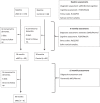Psychological stress, cognitive decline and the development of dementia in amnestic mild cognitive impairment
- PMID: 32108148
- PMCID: PMC7046646
- DOI: 10.1038/s41598-020-60607-0
Psychological stress, cognitive decline and the development of dementia in amnestic mild cognitive impairment
Abstract
To determine the relationship between psychological stress with cognitive outcomes in a multi-centre longitudinal study of people with amnestic mild cognitive impairment (aMCI) we assessed three parameters of psychological stress (Recent Life Changes Questionnaire (RLCQ); the Perceived Stress Scale (PSS) and salivary cortisol) and their relationship with rates of cognitive decline over an 18 month follow up period and conversion to dementia over a 5.5 year period. In 133 aMCI and 68 cognitively intact participants the PSS score was higher in the aMCI compared with control group but neither the RLCQ scores nor salivary cortisol measures were different between groups. In the aMCI group the RLCQ and the PSS showed no significant association with cognitive function at baseline, cognitive decline or with conversion rates to dementia but high salivary cortisol levels were associated with RLCQ scores and poorer cognitive function at baseline and lower rates of cognitive decline. No relationship was found between salivary cortisol levels and conversion rate to dementia. We conclude that psychological stress as measured by the RLCQ or PSS was not associated with adverse cognitive outcomes in an aMCI population and hypothesise that this may reflect diminished cortisol production to psychological stress as the disease progresses.
Conflict of interest statement
The authors declare no competing interests.
Figures
Similar articles
-
Clinical relevance of amnestic versus non-amnestic mild cognitive impairment subtyping in Parkinson's disease.Eur J Neurol. 2019 May;26(5):766-773. doi: 10.1111/ene.13886. Epub 2019 Jan 20. Eur J Neurol. 2019. PMID: 30565368
-
Neuropsychiatric predictors of conversion to dementia both in patients with amnestic mild cognitive impairment and those with subcortical vascular MCI.Clin Neurol Neurosurg. 2013 Aug;115(8):1264-70. doi: 10.1016/j.clineuro.2012.11.029. Epub 2013 Jan 3. Clin Neurol Neurosurg. 2013. PMID: 23290121
-
Frontal-executive dysfunction affects dementia conversion in patients with amnestic mild cognitive impairment.Sci Rep. 2020 Jan 21;10(1):772. doi: 10.1038/s41598-020-57525-6. Sci Rep. 2020. PMID: 31964931 Free PMC article.
-
Neuropsychological and neuroimaging characteristics of amnestic mild cognitive impairment subtypes: a selective overview.CNS Neurosci Ther. 2015 Oct;21(10):776-83. doi: 10.1111/cns.12391. Epub 2015 Mar 26. CNS Neurosci Ther. 2015. PMID: 25809732 Free PMC article. Review.
-
Supporting Resilience of Older Adults with Cognitive Decline Requires a Multi-Level System Approach.Gerontology. 2023;69(7):866-874. doi: 10.1159/000529337. Epub 2023 Feb 8. Gerontology. 2023. PMID: 36754032 Review.
Cited by
-
A Survey for Examining the Effects of COVID-19 and Infection Control Measures in Older Persons With Mild Cognitive Impairment and Dementia and Their Caregivers.Front Psychiatry. 2020 Nov 16;11:599851. doi: 10.3389/fpsyt.2020.599851. eCollection 2020. Front Psychiatry. 2020. PMID: 33304288 Free PMC article.
-
Associations between self-reported psychological symptom severity and gut microbiota: further support for the microgenderome.BMC Psychiatry. 2022 Apr 30;22(1):307. doi: 10.1186/s12888-022-03947-7. BMC Psychiatry. 2022. PMID: 35501777 Free PMC article.
-
Prevalence of suspected dementia in a sample of adults living in Kinshasa-Democratic Republic of the Congo.Alzheimers Dement. 2023 Sep;19(9):3783-3793. doi: 10.1002/alz.13003. Epub 2023 Mar 7. Alzheimers Dement. 2023. PMID: 36880714 Free PMC article.
-
Association of stressful life events with cognitive impairment in patients with type 2 diabetes mellitus.J Diabetes Investig. 2023 Jun;14(6):792-800. doi: 10.1111/jdi.14010. Epub 2023 Mar 29. J Diabetes Investig. 2023. PMID: 36987691 Free PMC article.
-
Psychosocial Stress Hastens Disease Progression and Sudden Death in Mice with Arrhythmogenic Cardiomyopathy.J Clin Med. 2020 Nov 24;9(12):3804. doi: 10.3390/jcm9123804. J Clin Med. 2020. PMID: 33255451 Free PMC article.
References
Publication types
MeSH terms
Grants and funding
- PG 143/150/Alzheimer's Society/International
- PG 143/150/Alzheimer's Society/International
- PG 143/150/Alzheimer's Society/International
- PG 143/150/Alzheimer's Society/International
- PG 143/150/Alzheimer's Society/International
- PG 143/150/Alzheimer's Society/International
- PG 143/150/Alzheimer's Society/International
- PG 143/150/Alzheimer's Society/International
- PG 143/150/Alzheimer's Society/International
- PG 143/150/Alzheimer's Society/International
- PG 143/150/Alzheimer's Society/International
- PG 143/150/Alzheimer's Society/International
LinkOut - more resources
Full Text Sources
Medical



